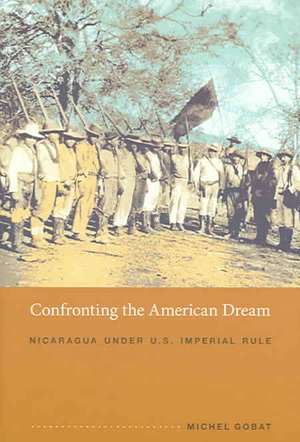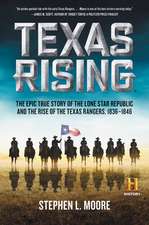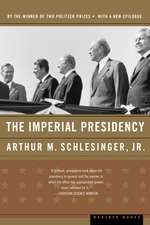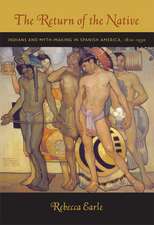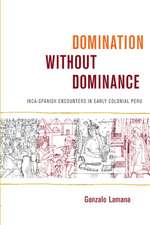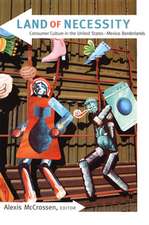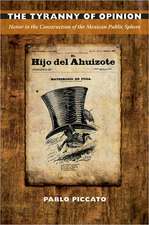Confronting the American Dream – Nicaragua under U.S. Imperial Rule: American Encounters/Global Interactions
Autor Michel Gobaten Limba Engleză Paperback – 26 dec 2005
Din seria American Encounters/Global Interactions
-
 Preț: 160.91 lei
Preț: 160.91 lei -
 Preț: 239.64 lei
Preț: 239.64 lei -
 Preț: 194.09 lei
Preț: 194.09 lei -
 Preț: 270.04 lei
Preț: 270.04 lei -
 Preț: 230.15 lei
Preț: 230.15 lei -
 Preț: 308.90 lei
Preț: 308.90 lei -
 Preț: 306.22 lei
Preț: 306.22 lei -
 Preț: 311.22 lei
Preț: 311.22 lei -
 Preț: 212.30 lei
Preț: 212.30 lei -
 Preț: 302.19 lei
Preț: 302.19 lei -
 Preț: 266.18 lei
Preț: 266.18 lei -
 Preț: 266.18 lei
Preț: 266.18 lei -
 Preț: 263.29 lei
Preț: 263.29 lei -
 Preț: 262.32 lei
Preț: 262.32 lei -
 Preț: 211.88 lei
Preț: 211.88 lei -
 Preț: 301.59 lei
Preț: 301.59 lei -
 Preț: 306.00 lei
Preț: 306.00 lei -
 Preț: 302.74 lei
Preț: 302.74 lei -
 Preț: 241.03 lei
Preț: 241.03 lei -
 Preț: 305.46 lei
Preț: 305.46 lei -
 Preț: 303.11 lei
Preț: 303.11 lei -
 Preț: 309.71 lei
Preț: 309.71 lei -
 Preț: 201.81 lei
Preț: 201.81 lei -
 Preț: 213.83 lei
Preț: 213.83 lei -
 Preț: 300.24 lei
Preț: 300.24 lei -
 Preț: 306.38 lei
Preț: 306.38 lei -
 Preț: 313.51 lei
Preț: 313.51 lei -
 Preț: 332.75 lei
Preț: 332.75 lei -
 Preț: 301.59 lei
Preț: 301.59 lei -
 Preț: 241.03 lei
Preț: 241.03 lei -
 Preț: 269.06 lei
Preț: 269.06 lei -
 Preț: 215.19 lei
Preț: 215.19 lei -
 Preț: 305.08 lei
Preț: 305.08 lei -
 Preț: 301.00 lei
Preț: 301.00 lei -
 Preț: 238.01 lei
Preț: 238.01 lei -
 Preț: 261.18 lei
Preț: 261.18 lei -
 Preț: 261.18 lei
Preț: 261.18 lei -
 Preț: 299.68 lei
Preț: 299.68 lei -
 Preț: 303.50 lei
Preț: 303.50 lei -
 Preț: 262.52 lei
Preț: 262.52 lei
Preț: 304.31 lei
Nou
Puncte Express: 456
Preț estimativ în valută:
58.24€ • 60.58$ • 48.08£
58.24€ • 60.58$ • 48.08£
Carte tipărită la comandă
Livrare economică 14-28 aprilie
Preluare comenzi: 021 569.72.76
Specificații
ISBN-13: 9780822336471
ISBN-10: 0822336472
Pagini: 392
Ilustrații: 26 illustrations, 3 tables, 5 maps
Dimensiuni: 161 x 235 x 26 mm
Greutate: 0.57 kg
Editura: MD – Duke University Press
Seria American Encounters/Global Interactions
ISBN-10: 0822336472
Pagini: 392
Ilustrații: 26 illustrations, 3 tables, 5 maps
Dimensiuni: 161 x 235 x 26 mm
Greutate: 0.57 kg
Editura: MD – Duke University Press
Seria American Encounters/Global Interactions
Recenzii
This is a beautifully argued and researched bookone of the most important and revealing case studies we have in U.S.Latin American relations. But it goes far beyond that. Without ever significantly moving past the 1930s, Michel Gobat has provided an indictment of the early-twenty-first-century embrace of American empire and, in a model of scholarship, provided stunning insights into the ironiesand tragediesof the misuse of U.S. power.Walter LaFeber, author of America, Russia, and the Cold War, 19452002Extraordinarily engaging, Confronting the American Dream is far and away the best work ever written on the convoluted path of elite/Conservative disenchantment with the U.S. imperial project in Nicaragua. Its relevance to broader historical and contemporary phenomena throughout Latin America and well beyond is really quite remarkable. Lowell Gudmundson, coauthor of Central America, 18211871: Liberalism before Liberal Reform[A] cautionary tale for current enthusiasts of U.S. empire
. As Gobat demonstrates, the more successful the U.S. occupation in achieving its own goals, the more instability it brought
. Max Paul Friedman, Journal of Colonialism and Colonial HistoryI believe the book provides essential knowledge for historians of Latin American and US foreign involvement . . . [T]his book can give broader viewpoints to sociologists and anthropologists interested in social change. Even practitioners of political science will find this book useful. . . .Nathan G. Johnson, The Latin Americanist
"This is a beautifully argued and researched book--one of the most important and revealing case studies we have in U.S.-Latin American relations. But it goes far beyond that. Without ever significantly moving past the 1930s, Michel Gobat has provided an indictment of the early-twenty-first-century embrace of 'American empire' and, in a model of scholarship, provided stunning insights into the ironies--and tragedies--of the misuse of U.S. power."--Walter LaFeber, author of America, Russia, and the Cold War, 1945-2002 "Extraordinarily engaging, Confronting the American Dream is far and away the best work ever written on the convoluted path of elite/Conservative disenchantment with the U.S. imperial project in Nicaragua. Its relevance to broader historical and contemporary phenomena throughout Latin America and well beyond is really quite remarkable."-- Lowell Gudmundson, coauthor of Central America, 1821-1871: Liberalism before Liberal Reform "[A] cautionary tale for current enthusiasts of U.S. empire... As Gobat demonstrates, the more successful the U.S. occupation in achieving its own goals, the more instability it brought..." --Max Paul Friedman, Journal of Colonialism and Colonial History "I believe the book provides essential knowledge for historians of Latin American and US foreign involvement ... [T]his book can give broader viewpoints to sociologists and anthropologists interested in social change. Even practitioners of political science will find this book useful..."--Nathan G. Johnson, The Latin Americanist
"This is a beautifully argued and researched book--one of the most important and revealing case studies we have in U.S.-Latin American relations. But it goes far beyond that. Without ever significantly moving past the 1930s, Michel Gobat has provided an indictment of the early-twenty-first-century embrace of 'American empire' and, in a model of scholarship, provided stunning insights into the ironies--and tragedies--of the misuse of U.S. power."--Walter LaFeber, author of America, Russia, and the Cold War, 1945-2002 "Extraordinarily engaging, Confronting the American Dream is far and away the best work ever written on the convoluted path of elite/Conservative disenchantment with the U.S. imperial project in Nicaragua. Its relevance to broader historical and contemporary phenomena throughout Latin America and well beyond is really quite remarkable."-- Lowell Gudmundson, coauthor of Central America, 1821-1871: Liberalism before Liberal Reform "[A] cautionary tale for current enthusiasts of U.S. empire... As Gobat demonstrates, the more successful the U.S. occupation in achieving its own goals, the more instability it brought..." --Max Paul Friedman, Journal of Colonialism and Colonial History "I believe the book provides essential knowledge for historians of Latin American and US foreign involvement ... [T]his book can give broader viewpoints to sociologists and anthropologists interested in social change. Even practitioners of political science will find this book useful..."--Nathan G. Johnson, The Latin Americanist
Notă biografică
Textul de pe ultima copertă
"Extraordinarily engaging, "Confronting the American Dream" is far and away the best work ever written on the convoluted path of elite/Conservative disenchantment with the U. S. imperial project in Nicaragua. Its relevance to broader historical and contemporary phenomena throughout Latin America and well beyond is really quite remarkable."-- Lowell Gudmundson, coauthor of "Central America, 1821-1871: Liberalism before Liberal Reform"
Cuprins
Descriere
Asks how a virulent anti-Americanism developed in a Nicaraguan society that also seemed to embrace Americanization fervently and explores the historical roots of this paradox
